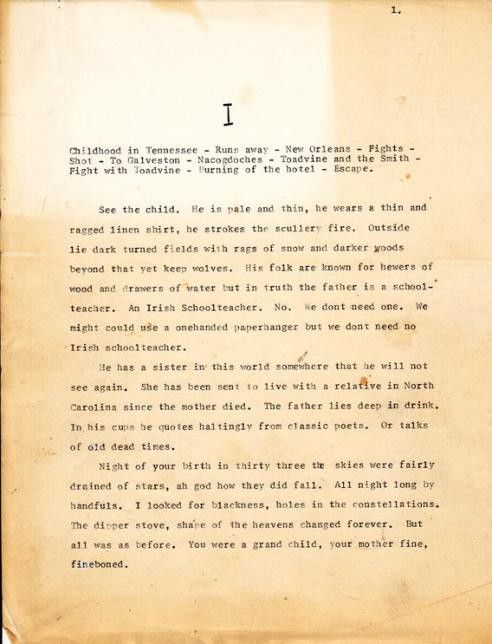If Moby-Dick were the only Herman Melville book I’d ever read, I would have assumed that he was a mediocre writer with great ideas. Having gone through all of his shorter works, however, I know he could be a precise and cogent talent. He seemed to have reached for everything with his most famous novel–aiming to fashion a sort of Shakespearean Old Testament story of good and evil–and buckled under the weight of his ambitions.
The far better Moby-Dick is Cormac McCarthy’s 1992 Blood Meridian: Or the Evening Redness in the West, a horse opera of Biblical proportions, a medicine show peddling poison, which takes an unsparing look at our black hearts and leaves the reader with a purple bruise. Twenty-five years on, it remains as profound and disturbing as any American novel.
The British writer David Vann reveals he’s similarly admiring of this McCarthy work in a “Twenty Questions” interview in the Times Literary Supplement. He’s also despairing of what he believes is the bleak future of literature. I believe as long as humans are largely human, we’ll always enamored by narratives. My fear is mainly that sometimes we choose the wrong ones.
An excerpt:
Question:
Is there any book, written by someone else, that you wish you’d written?
David Vann:
There are hundreds, but the foremost from this time is Cormac McCarthy‘s Blood Meridian, which I think is the greatest novel ever written in English. He’s not a dramatist, and I write Greek tragedy, so I never could have imagined skipping the dramatic plane and going straight to vision. I do write in the same American landscape tradition, extending literal landscapes into figurative ones, but I’ll never do it as powerfully as he does.
Question:
What will your field look like twenty-five years from now?
David Vann:
Less money for sure. We’ve already lost so much to piracy and shrinking readerships and economic downturns. Publishers will be less brave, editors will edit less, more books will be published online for nothing, we’ll continue to lose experts and have to put up with even more reviews from unqualified idiots, and as entire generations learn to read without subtext about what someone had for lunch, we can expect literature to look more like an account of what someone had for lunch. There is absolutely no way in which the technology or literary theory of the past decades will enrich literature. We should be honest about what is crap. …
Question:
What author or book do you think is most overrated? And why?
David Vann:
I should never answer this kind of question, because I’m only shooting myself in the foot, but when Jonathan Franzen appeared on the cover of Time as the Great American Novelist, who could not have thought of McCarthy, Proulx, Robinson, Morrison, Oates, Roth, DeLillo and at least a hundred others far better than Franzen? And to call The Corrections the best book in ten years? Really?•
Tags: Cormac McCathy, David Vann

